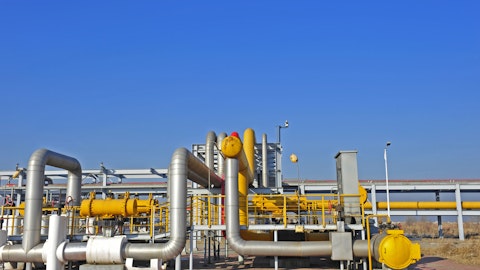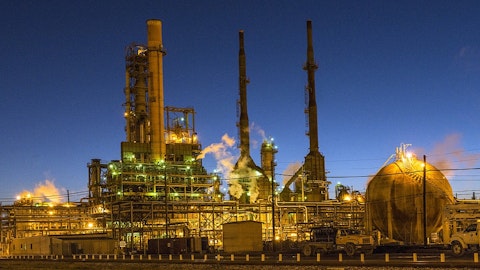Pentair plc. Ordinary Share (NYSE:PNR) is a lesser known dividend aristocrat that most recently boosted its dividend by 5%, representing its 40th consecutive year of dividend increases.

Weak energy markets, slumping commodity prices, and unfavorable foreign currency exchange rates are wreaking havoc on the company, which has seen its stock price plummet by more than 30% over the last year.
However, two of the company’s four segments delivered organic growth last year, and a third is poised to return to growth in 2016. Three of its businesses have also delivered healthy margin expansion, and a well-known activist investor took a 7% stake in the company in mid-2015 (the stock has since sold off by nearly 40%).
PNR is not very popular among the funds tracked by Insider Monkey, as only 23 funds reported long positions as of the end of September. However, these funds amassed nearly 12% of the company’s outstanding stock. Billionaire activist Nelson Peltz’s Trian Partners is one of the funds bullish on PNR and it reported 13 million shares in its last 13F filing.
Perhaps there is a buying opportunity here for our Top 20 Dividend Stocks portfolio?
Business Overview
PNR was formed in 1966 and is a diversified industrial manufacturing company that sells a wide range of products including valves, water system products, actuators, switches, pumps, filters, enclosures, heat management systems, and more.
By end market, PNR generated 33% of its 2015 sales in the residential and commercial construction, 25% in industrial, 23% in energy, 10% in food & beverage, and 9% in infrastructure markets.
By geography, PNR generated 49% of its 2015 sales in the U.S., 18% in Western Europe, 14% in China / SE Asia / India / Middle East, 13% in the Rest of the World, and 6% in Canada.
Segments
Technical Solutions (33% of sales, 22% segment margin): sells products that guard and protects some of the world’s most sensitive electronics and electronic equipment, as well as heat management solutions designed to provide thermal protection to temperature sensitive fluid applications.
Valves & Controls (27% of sales, 13% segment margin): sells valves, fittings, automation and controls, and actuators. PNR acquired most of this segment from Tyco International’s spinoff of its flow control business in 2012. Nearly 60% of this segment is exposed to energy markets, with the remaining 40% selling into industrial markets. Half of the business is aftermarket products and services.
Flow & Filtration Solutions (20% of sales, 13% segment margin): sells solutions for filtration, separation, flow and fluid management challenges in agriculture, food & beverage processing, water supply, and a variety of industrial applications.
Water Quality Systems (20% of sales, 20% segment margin): sells water system products and solutions to meet filtration and fluid management challenges in food & beverage, water, swimming pools, and aquaculture applications.
Business Analysis
While PNR has a number of technologically-advanced products, R&D is not a major competitive advantage (the company spends 1.5-2.0% of its sales on R&D, which amounted to $117 million in 2014).
Instead, the company’s advantages primarily come from its long-standing customer relationships (PNR has 50 years of operating history), focus on profitable niches, reputation for quality, wide assortment of products, technical know-how, and sizable distribution network.
Pentair plc. Ordinary Share (NYSE:PNR) also has a large global installed base, which provides meaningful aftermarket revenue. This business generates less volatile cash flow that can be used for acquisitions. PNR’s markets are highly fragmented, so it has plenty of opportunity to continue consolidating the industry.
Like many other industrial companies, PNR also has its own management system grounded in lean methodologies. PNR began its initial lean deployments in 2005 and believes lean operations are now part of its DNA, driving productivity throughout the enterprise.
The company expects to significantly rationalize its footprint over the next five years by reducing its number of factories and distribution centers by at least 30%. When global growth is slow, these are the levers that industrial companies have to pull to protect their earnings and position themselves for the next upturn.
Management is doing everything they can to pull costs out of PNR’s Valves & Controls business, which is experiencing mid-teens sales declines. There is not much more PNR can do, but management has shown a willingness to shed non-strategic, lousy businesses in the past if it cannot generate a good return.
Follow Pentair Plc (NYSE:PNR)
Follow Pentair Plc (NYSE:PNR)
Receive real-time insider trading and news alerts
Pentair’s Key Risks
PNR’s diversification by product, end market, and geography help protect the company from being decimated by any single macro factor, but the business will always be sensitive to broader trends in global economic growth.
PNR’s exposure to energy (23% of sales) and industrial (25%) markets is hurting its results today. Oil & gas customers are spending less and pushing back hard on pricing, which is compressing PNR’s profits. Unfavorable foreign currency exchange rates are also impacting the company’s growth.
We believe the rest of 2016 will remain challenging, but some of PNR’s other markets are performing better (e.g. food & beverage). Over the long run, we expect the macro environment to revert to the mean.
The greater risk to PNR’s earnings power would be if its products were increasingly commoditized or the company makes a foolish acquisition that endangers the company’s health. We view these risks as being unlikely events.
Dividend Analysis: Pentair
We analyze 25+ years of dividend data and 10+ years of fundamental data to understand the safety and growth prospects of a dividend. PNR’s long-term dividend and fundamental data charts can all be seen by clicking here.
Dividend Safety Score
Our Safety Score answers the question, “Is the current dividend payment safe?” We look at factors such as current and historical EPS and FCF payout ratios, debt levels, free cash flow generation, industry cyclicality, ROIC trends, and more. Scores of 50 are average, 75 or higher is very good, and 25 or lower is considered weak.
PNR’s Dividend Safety Score is 41, indicating its safety is close to average. The company’s dividend has consumed 50% of its earnings and 39% of its free cash flow over its last four quarters, which is reasonably healthy for a macro-sensitive business. PNR’s free cash flow payout ratio has also remained mostly stable around 30% during its last 10 fiscal years, giving us further confidence in the business.

Source: Simply Safe Dividends
As we mentioned earlier, PNR’s business is sensitive to the economy. While the company’s sizable aftermarket sales base reduces some of its volatility, PNR’s revenue still dropped by 20% in 2009, and its stock fell by 31% in 2008. This isn’t the best business to own in the event of a recession.

Source: Simply Safe Dividends
Compared to other high quality industrial companies such as Illinois Tool Works (ITW) and Parker-Hannifin (PH), PNR’s return on invested capital is relatively disappointing. ITW and PH generate returns on capital that are roughly twice as high as PNR’s returns, indicating that they are in more profitable niches and have been superior allocators of capital.
Trian, the activist investor involved with PNR, probably believes PNR is under earning and can improve its returns with the right acquisitions and productivity initiatives.

Source: Simply Safe Dividends
While PNR’s returns on capital are more mediocre than we like to see, its cash flow generation has been excellent. As seen below, PNR has delivered free cash flow in nine of the last 10 years and has more than doubled its annual free cash flow generation over the last decade. Consistently generating free cash flow gives PNR flexibility to pursue acquisitions and sustainably grow its dividend.

Source: Simply Safe Dividends
PNR’s balance sheet is the biggest factor weighing on the company’s Dividend Safety Score. As seen below, PNR has just $126 million of cash on hand compared to $4.7 billion in debt. Its dividend payments last year also exceed the company’s current cash balance, putting pressure on the company to generate enough cash flow to keep funding its dividend and operations. If it weren’t for PNR’s consistent free cash flow generation and large aftermarket business, this would be a bigger issue.

Source: Simply Safe Dividends
Dividend Growth Score
Our Growth Score answers the question, “How fast is the dividend likely to grow?” It considers many of the same fundamental factors as the Safety Score but places more weight on growth-centric metrics like sales and earnings growth and payout ratios. Scores of 50 are average, 75 or higher is very good, and 25 or lower is considered weak.
PNR plans to raise its dividend by 5% in 2016, marking its 40th consecutive dividend increase. The company is a dividend aristocrat and will also join the dividend kings list in 10 years. PNR’s Dividend Growth Score is 68, which indicates that the company has above-average long-term dividend growth potential.
While macro headwinds will restrict near-term earnings and dividend growth, we can see that PNR’s dividend growth rate otherwise accelerated over the last decade. Assuming macro conditions eventually normalize and PNR returns to a 9-11% earnings growth rate, we expect the company’s dividend to resume growth at a high-single digit rate.

Source: Simply Safe Dividends
Valuation
Pentair plc. Ordinary Share (NYSE:PNR) trades at 11x forward earnings and has a dividend yield of 3.1%, which is significantly higher than its five year average yield of 1.9%.
Management also believes PNR can deliver 2-4% organic sales growth and 9-11% annual earnings per share growth over the long term, which would imply 12-14% annual total return potential even if PNR’s earnings multiple remains depressed. The market must think that PNR’s business trends are going to get worse before they get better.
We think the stock is starting to look attractively priced for investors with a time horizon of at least five years. However, we think the company’s balance sheet and high exposure to energy markets are two factors that could inflict even more damage to the stock over the next 6-12 months. We would prefer to stick with some other blue chip dividend stocks that are also going on sale in today’s market.
Conclusion
With major energy companies calling for even deeper spending cuts by the day, it’s hard to get too excited about PNR at the moment. There is very little the company can do to combat the slump in commodity prices and the slow growth rate of economies around the world.
While we believe these headwinds will ultimately prove to be transitory, they could persist longer than investors expect. The company’s levered balance sheet adds further risk to an investment in PNR today. We will remain on the sidelines for now.
Disclosure: None



